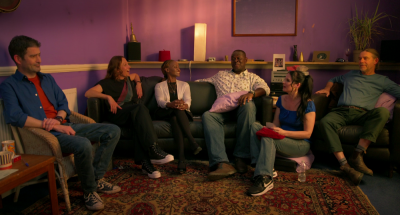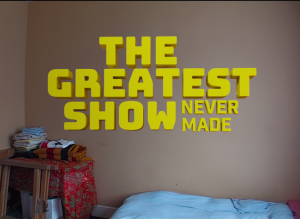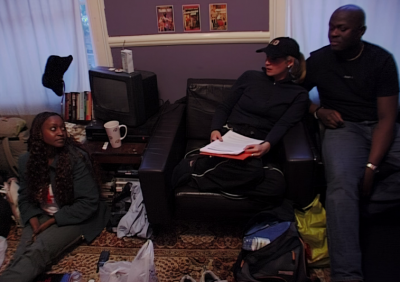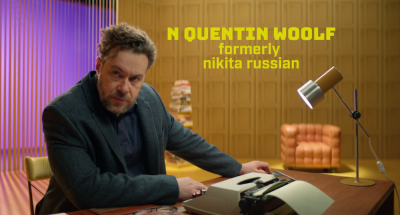The Greatest Show Never Made
m (→Synopsis) |
(→Synopsis) |
||
| Line 24: | Line 24: | ||
Episode three details how the remaining team turned the tables on Russian, exposing him in a story on ''London Tonight'', but also allows the fomer Nik Russian (now N Quentin Woolf) to give his side of the story. The six team members, previously interviewed separately, are finally reunited and we get an update on what happened to them after the show that never was. With perhaps one exception, they are broadly sympathetic to Russian who in hindsight they see as a fantastist out of his depth rather than a conman. And indeed, while Amazon categorise this as a "true crime" documentary, there is no actual crime involved. | Episode three details how the remaining team turned the tables on Russian, exposing him in a story on ''London Tonight'', but also allows the fomer Nik Russian (now N Quentin Woolf) to give his side of the story. The six team members, previously interviewed separately, are finally reunited and we get an update on what happened to them after the show that never was. With perhaps one exception, they are broadly sympathetic to Russian who in hindsight they see as a fantastist out of his depth rather than a conman. And indeed, while Amazon categorise this as a "true crime" documentary, there is no actual crime involved. | ||
| + | |||
| + | While ''The Great Reality TV Swindle'' from its title down invited the interpretation that gullible people had been the victims of a scam (illustrated here by a clip of [[Harry Hill]] mocking them on that basis on ''TV Burp''), ''The Greatest Show Never Made'' takes a more balanced view informed by twenty years of hindsight and an unfashionable degree of empathy for all involved. Here, we see that there ''was'' a coherent, if perhaps overly idealistic, concept behind the show - one that might even have found a channel willing to commission it, albeit not from a ramshackle one-man operation like Nikita Russian Productions. The "business TV" boom hadn't quite arrived in 2002 but the idea of getting people to make a million pounds in a year might have been a flyer even then. And the notion of having the teams film and present the footage themselves wasn't a crazy idea - it was (though this series fails to point it out) basically the same model used for the docusoap ''Castaway 2000''. Where it fell down was that Russian's notion of depending on the kindness of strangers may have worked when it came to blagging some ingredients to make a cake (a task given to hopefuls at the audition, and noted by several participants, as well as the hired director, to have been a lot of fun to do), but not when trying to get a commission for an ambitious and poorly-planned reality show produced by an unknown and filmed by semi-amateurs. | ||
== Web links == | == Web links == | ||
Revision as of 09:39, 10 November 2023
Contents |
Host
no host, no voiceover
Co-hosts
Principal contributors: Rosy Burnie, John Comyn, Tim Eagle, Jane Marshall, Lucie Miller, Daniel Pope and N Quentin Woolf
Broadcast
Safe Harbour Films and Factual Fiction in association with B Good Picture Company for Amazon Prime Video, 11 October 2023 (3 episodes in 1 series)
Synopsis
In 2001, Nikita Russian came up with the idea for a reality TV series. In 2002, The Great Reality TV Swindle told the story of how that idea crashed and burned. In 2023, Amazon Prime Video revisited the story, expanding it to three 40-50 minute episodes.
The first sets the scene and covers the initial contestant call, the auditions, and the show launch, at which doubts began to surface - leading to two teams dropping out almost immediately, and the third refusing to sign their contracts and repairing to cameraman Tim's flat to ponder their options. The second shows how Russian's lies unravelled, as well as looking into his history. His childhood friend Michael Fabbri fills in some of the story of the boy he knew as Keith Gillard, and we see some of the skits they filmed together. Weaving through this episode are contributions from "Person Tracing Analyst" Tanya Hall who was asked to uncover Russian's whereabouts, leading to the big end-of-episode reveal: not only did she find him, but he's been persauded to talk for this series.
Episode three details how the remaining team turned the tables on Russian, exposing him in a story on London Tonight, but also allows the fomer Nik Russian (now N Quentin Woolf) to give his side of the story. The six team members, previously interviewed separately, are finally reunited and we get an update on what happened to them after the show that never was. With perhaps one exception, they are broadly sympathetic to Russian who in hindsight they see as a fantastist out of his depth rather than a conman. And indeed, while Amazon categorise this as a "true crime" documentary, there is no actual crime involved.
While The Great Reality TV Swindle from its title down invited the interpretation that gullible people had been the victims of a scam (illustrated here by a clip of Harry Hill mocking them on that basis on TV Burp), The Greatest Show Never Made takes a more balanced view informed by twenty years of hindsight and an unfashionable degree of empathy for all involved. Here, we see that there was a coherent, if perhaps overly idealistic, concept behind the show - one that might even have found a channel willing to commission it, albeit not from a ramshackle one-man operation like Nikita Russian Productions. The "business TV" boom hadn't quite arrived in 2002 but the idea of getting people to make a million pounds in a year might have been a flyer even then. And the notion of having the teams film and present the footage themselves wasn't a crazy idea - it was (though this series fails to point it out) basically the same model used for the docusoap Castaway 2000. Where it fell down was that Russian's notion of depending on the kindness of strangers may have worked when it came to blagging some ingredients to make a cake (a task given to hopefuls at the audition, and noted by several participants, as well as the hired director, to have been a lot of fun to do), but not when trying to get a commission for an ambitious and poorly-planned reality show produced by an unknown and filmed by semi-amateurs.
Web links
Amazon Prime Video programme page
Pictures
 And here with three more, reunited in this series' final episode.
And here with three more, reunited in this series' final episode.Left to right: John Comyn, Lucie Miller, Rosy Burnie, Daniel Pope, Jane Marshall, Tim Eagle.




